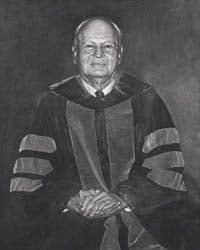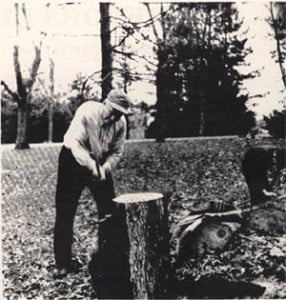 On February 2, 1977, Dr. James Oliver Buswell Jr. was called to his heavenly home. It can truly be said of him, he had fought a good fight, he had finished his course, and he had kept the Faith.
On February 2, 1977, Dr. James Oliver Buswell Jr. was called to his heavenly home. It can truly be said of him, he had fought a good fight, he had finished his course, and he had kept the Faith.
At the age of 82 he could look back upon a life of dedication and service to his Master, Who had endowed him with many gifts, great wisdom and outstanding leadership. He has been taken.from our midst, but his labors stand as a testimony of praise to God, Who was pleased to use him in many and varied ministries.
As a seminary student he entered the military service of his country as a Chaplain in the First World War, where he ministered to soldiers even in the thick of battle. He was wounded in the line of duty and was cited in General Orders and received the Purple Heart and Silver Star.
After the war he took up a pastorate in the Perseverance Presbyterian Church, Milwaukee, Wisconsin—1919 to 1922. His next pastorate was in the Grace Reformed Presbyterian Church in Brooklyn, N.Y., from 1922 to 1926.
In the fall of 1925 he delivered a series of evangelistic messages at Wheaton College, Wheaton, 111. Shortly after that Dr. Charles A. Blanchard, the President of Wheaton College, died. Dr. Buswell was called to be the third president of Wheaton and was installed in April of 1926. He served there for 14 years in a most effective manner. During his administration the College grew numerically, its financial position was strengthened, new facilities were added, and it became fully accredited by the North Central Association of Colleges and Universities. It was during his administration that the Wheaton Graduate School was established. He remained at Wheaton until 1940.
Following this he taught for a short time at Faith Seminary. In January of 1941 he was called to the presidency of the National Bible Institute of New York City, which, under his leadership became Shelton College. The school also grew and developed under his 15 years of able leadership.
In 1956 he was called to be Dean of Covenant Seminary, St. Louis, Missouri, where he served for 14 years until his retirement in 1970. He and his wife moved to The Quarryville Presbyterian Home as guests, but here too he continued his ministry of speaking and writing.
He is known for his writings, especially the two volumes of Systematic Theology of the Christian Religion, which is widely used today.
In 1936 Dr. Buswell, together with Dr. J. Gresham Machen, Dr. Harold S. Laird, and others, took his stand fearlessly for the Word of God in opposition to the forces of modernism in the Presbyterian Church U.S.A. There was a great price to be paid from a human standpoint but, like Paul, he counted not his life dear to himself that he might finish the course God had given him. He, with the others mentioned, became the leaders of a new movement committed uncompromisingly to a loyalty to God and the Scriptures.
He helped form the Presbyterian Church of America in June of 1936, which then changed its name to the Orthodox Presbyterian Church. In the of 1937 he was a leader in the group which became the Bible Presbyterian Church and later changed its name to the Evangelical Presbyterian Church. In all of this trying and developing experience of the church his leadership was evident and greatly respected.
 Pictured at left: Dr. Buswell engaged in his favorite form of exercise, chopping wood!
Pictured at left: Dr. Buswell engaged in his favorite form of exercise, chopping wood!
He served on the Fraternal Relations Committee used to bring about the union of the Reformed Presbyterian Church in North America and the Evangelical Presbyterian Church in 1965. This resulted in the formation of the Reformed Presbyterian Church, Evangelical Synod.
One of the key issues which evidenced departure from the Word of God was that of the Foreign Missions Board of the Presbyterian Church U.S.A. Out of this arose the Independent Board for Presbyterian Foreign Missions. Dr. Buswell was one of the founders under the leadership of Dr. Machen. In the developing Evangelical Presbyterian Church, the same urgency of missions continued under Dr. Buswell’s leadership and the Board of World Presbyterian Missions was created and continued to serve as the missionary arm of the Reformed Presbyterian Church, Evangelical Synod. Dr. Buswell served on this board until his death.
Dr. Buswell served on many boards, agencies and committees of the Re¬formed Presbyterian Church, Evangelical Synod. When the denomination was newly established, he had the joy of having a great input to its growth and development.
A great man has fallen, but God’s course continues—“He being dead, yet speaketh.” He has left the challenge to those who continue under the same Head of the Church, our Lord Jesus Christ.
Dr. Buswell was survived by his dear wife, a faithful helpmeet for 59 years, and four children, all active in God’s work: Jane (Mrs. Philip Foxwell), Ruth (Mrs. Edward Noe), Dr. James Oliver Buswell III, and Dr. John Buswell. There are also ten grandchildren and seven great grandchildren as well as a host of friends, both in heaven and in all parts of the world.
As a member of the Philadelphia Presbytery, our Synod, numerous boards and agencies, Dr. Buswell deserves the thanks to God which we all join in giving for this our fellow Christian. We thank God upon every remembrance of him. Our prayers and sincere sympathy are with his dear wife and all the members of his family. Joshua 1:2–3: “Moses my servant is dead; now therefore arise, go over this Jordan, thou, and all this people, unto the land which I do give to them, even to the children of Israel. Every place that the sole of your foot shall tread upon, that have I given unto you, as I said unto Moses.”
Words To Live By:
The challenge is for us to arise and possess that which God has promised us as His people. There remains yet much to be possessed for God’s kingdom.
[The text above, with a few minor edits, was the text of the Memorial for Dr. Buswell, as published in the Minutes of the 155th General Synod of the Reformed Presbyterian Church, Evangelical Synod.]

